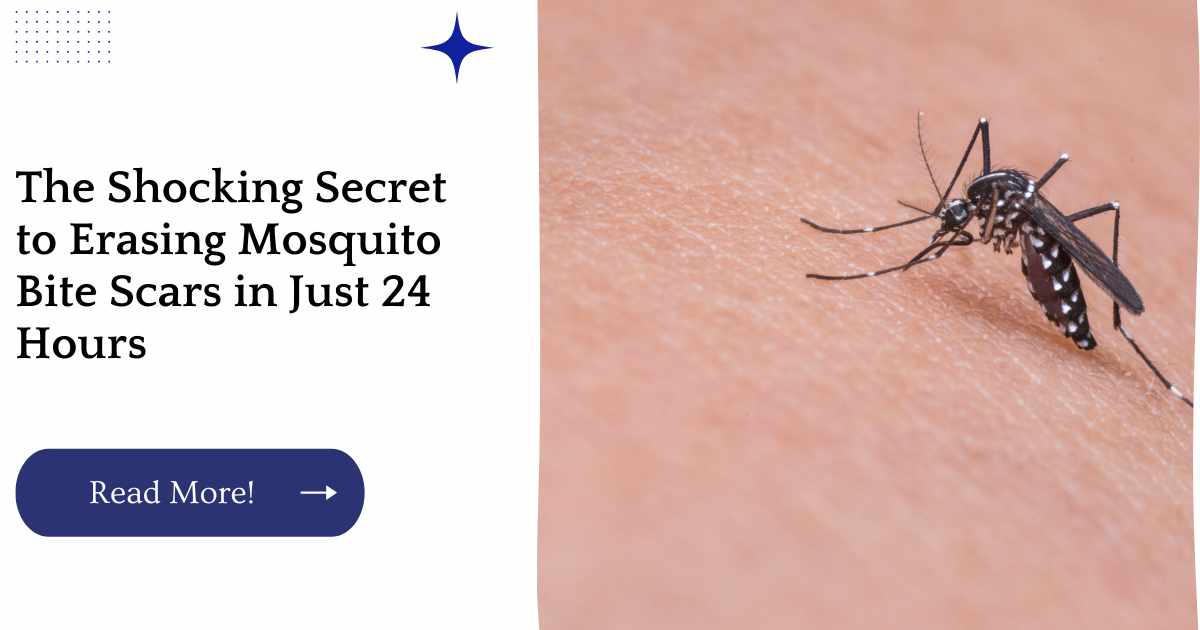Mosquito bites are annoying and can even be painful. But the itchiness and swelling doesn’t last forever—so how can you get rid of those unsightly red marks that remain after a mosquito attack?
The good news is there are many different ways to treat mosquito bite scars that range from simple home remedies to more advanced treatments like laser surgery. So don’t worry about your mosquito bite scars! We’ll take them away for you:
| Key Takeaways |
|---|
| Prevention is key to avoiding mosquito bites. |
| There are several effective remedies to reduce the swelling and discomfort caused by mosquito bites. |
| Minimizing the appearance of mosquito bite scars can be achieved through simple treatments. |
| It’s important to be aware of mosquito-borne illnesses and their symptoms. |
| Proper care and treatment of mosquito bites can help prevent scarring and promote healthy skin. |
Take A Zyrtec
If you’re like us, then you know the feeling of having mosquito bites in places that are hard to reach. You get itchy and uncomfortable as the day goes on, but you don’t want to scratch because that would only make things worse.
But what if I told you there was a treatment available right now—no trip to the doctor’s office necessary? It’s called Zyrtec and it’s an antihistamine. (If your ears perked up at that word “antihistamine,” then this is for you.)
So how does Zyrtec work? Well, think about how allergic reactions work: Your body produces histamines during an allergic reaction so that it can defend itself against allergens like dust mites or pollen.
These histamines cause itching around your mosquito bite and swelling around its borders; this swelling creates more itching! It’s a vicious cycle…and one we don’t need any more of!
When it comes to avoiding mosquito bites, prevention is key. Our easy guide on getting rid of mosquitoes offers practical tips that can help you reduce your risk of mosquito bites and stay safe.
Apply Ice
This is the number one thing that you can do to treat mosquito bites. Applying ice to the area will help reduce swelling, inflammation and pain.
It’s also a great way to numb your bite so that it feels less irritating when you’re trying to sleep at night.
If you can, apply ice for 10 minutes every two hours until the redness goes away or at least reduces significantly in size.
You can keep reapplying this treatment over the course of 24 hours if necessary and even during this time frame if there’s any itching or irritation still going on!
| Benefits | How to Apply |
|---|---|
| Reduces swelling | Wrap ice in a cloth and apply to the affected area for 10-15 minutes at a time. |
| Soothes itching | Use an ice pack or ice wrapped in a cloth to soothe itchy skin. |
| Provides quick relief | Applying ice to a mosquito bite can provide immediate relief from swelling, itching, and discomfort. |
Slather On Anti-Itch Cream
If you’re like us, you probably don’t want to deal with the itching that comes along with mosquito bites. To make it easier on yourself and avoid scratching at the bite, slather on some anti-itch cream or lotion.
You can use any brand of anti-itch cream for this purpose; we recommend using something that feels soothing and moisturizing (such as Aveeno) so your skin stays healthy in the long run.
Use Baking Soda Paste
If you’ve already tried the previous methods and found them lacking, try mixing baking soda and water to make a paste.
Apply this paste to the affected area, let it dry for at least five minutes (you may want to use an old towel or paper towel under your leg), then wash off the excess with warm water. Repeat as needed until the scar disappears!
Some people find that applying heat helps with healing mosquito bites quicker; if you’re one of these people, try using warm compresses instead of cold ones—just be careful not to burn yourself!
Mosquito bites can be incredibly itchy and uncomfortable, but there are simple ways to reduce the swelling and irritation. Our guide on reducing the swelling of a mosquito bite offers tips on how to alleviate the discomfort and feel better.
Try An Oatmeal Bath
The first thing to do is mix together a good amount of oatmeal with some water to create an oatmeal bath.
There are different ways that you can go about this. The most common way is to take a mug and fill it up with oats until they are submerged in water, then use the microwave or stovetop to heat them up until they reach a soft consistency.
If you want more control over how thick the mixture becomes, there’s another option: put an equal amount of oats into an oven-safe bowl and place it inside your oven at 200 degrees Fahrenheit for around 20 minutes (check on them frequently).
When the time comes, remove from the oven and let cool down before adding your warm bath water!
Switch Up Your Shower Time
If you’re looking for a way to control the itching and swelling of mosquito bites, one of the best things you can do is shower at different times each day.
The water will help remove dead skin cells, which will make your skin more comfortable.
Showering in the morning allows you to start your day off feeling refreshed and relaxed before dealing with any other stressors that might come up throughout the day.
Showering at night is also helpful because it helps reduce swelling overnight so that when you wake up in the morning, there’s less chance of getting an unsightly mark on your face or body from when it was bitten earlier in the evening.
In addition to helping with itching and swelling, showering during different parts of the day has another benefit: It allows for better hydration throughout each 24-hour period!
Dealing with mosquito bites can disrupt your sleep and ruin your day. Our guide on getting rid of mosquito bites overnight offers simple and effective ways to minimize the appearance of mosquito bites and helps you get a good night’s sleep.
Dab On Apple Cider Vinegar
After you’ve gotten the itch out of your system, it’s time to tackle your mosquito bite scars. Apple cider vinegar is a natural antiseptic that helps heal wounds and reduce inflammation.
Simply dab some on the affected area using a cotton ball or swab and let it dry naturally.
This will help treat any swelling or itching caused by the mosquito bites themselves and can also be used as an astringent to speed up healing time in general.
Smear On Petroleum Jelly
To get rid of mosquito bite scars, you have to not only apply a healing ointment to the affected area but also leave it on long enough for it to work its magic.
To do this, smear petroleum jelly onto your skin and leave it there for at least 10 minutes. Afterward, wash off with warm water and repeat twice per day until your rash goes away.
Opt For Witch Hazel
Witch hazel is a natural astringent that helps to shrink the swollen tissue and reduce inflammation. It’s also great at soothing any redness or stinging sensations you may be experiencing.
To apply witch hazel, simply apply a few drops of it to your mosquito bite scars with some cotton balls or pads; then let it sit for about 15 minutes before rinsing off. You can use this treatment up to twice per day if needed (morning and night).
Make It Volcanic By Applying Rubbing Alcohol
Rubbing alcohol is an astringent, which will help to dry up the area and reduce swelling. It also helps to kill any bacteria that might be causing you pain, as well as stop itching.
Use a cotton ball or swab to apply it directly onto your mosquito bite scars (don’t worry about being too precise).
Don’t let mosquitoes ruin your outdoor activities. Our guide on keeping mosquitoes away offers proven tips to help you keep mosquitoes at bay and enjoy your time outdoors without any interruptions.”
Try A Tea Tree Oil Treatment
Most people know that tea tree oil is a natural antiseptic and has been used for years to treat acne, infections, and other skin issues. But did you know that it’s also effective against mosquitoes?
A study published in the Journal of Insect Science found that tea tree oil is 100% effective against mosquitoes when sprayed on their legs.
While they don’t yet know exactly why this works so well, they hypothesize that it may be due to its “content” of chemicals called monoterpenes which are known to have strong antifungal properties.
Researchers also determined that tea tree oil was safe for children (though not pregnant or nursing women) and adults too making it an appealing treatment option for anyone who wants to avoid applying harsh chemicals directly onto their skin but still wants relief from mosquito bites fast!
If you’re looking for quick relief from mosquito bites, our guide on getting rid of mosquito bites quickly offers simple remedies that can help you alleviate the itching and discomfort caused by mosquito bites in no time
Conclusion
Unfortunately, these are just some of the many ways to combat the painful aftermath of a mosquito bite.
If you want to keep your skin looking as great as possible, you’ll have to be vigilant about avoiding new bites.
This means wearing long sleeves and pants when going outside during prime mosquito hours (around sunset).
Further Reading
Here are some additional resources that can help you learn more about mosquito bites and how to care for them:
How to Treat Mosquito Bites to Prevent Scarring: This comprehensive guide covers everything you need to know about treating mosquito bites and preventing scarring.
Tips for Getting Rid of Mosquito Bite Scars: This article provides useful tips and strategies for reducing the appearance of mosquito bite scars.
How to Get Rid of Mosquito Bite Marks: This informative post offers tips on how to naturally lighten mosquito bite marks and promote healthy skin.
FAQs
What are mosquito bites?
Mosquito bites are skin reactions caused by female mosquitoes that pierce the skin with their proboscis to feed on blood.
Why do mosquito bites itch?
Mosquito bites can cause itching because of the body’s immune response to the mosquito’s saliva, which acts as an anticoagulant to prevent the blood from clotting.
How do you prevent mosquito bites?
You can prevent mosquito bites by using insect repellent, wearing protective clothing, staying indoors during peak mosquito activity times, and removing standing water from your property.
What are the symptoms of mosquito-borne illnesses?
Symptoms of mosquito-borne illnesses can vary depending on the virus or parasite responsible for the infection. Common symptoms include fever, headache, body aches, and rash.
How do you treat mosquito bites?
You can treat mosquito bites by cleaning the affected area with soap and water, applying a cold compress, using over-the-counter antihistamines and topical creams, and avoiding scratching the bite.

Hello! I’m Hellen James, and I write about how to keep pests from invading your home. For the last 10 years, I’ve been working in pest control and am excited to share my expertise with you!


